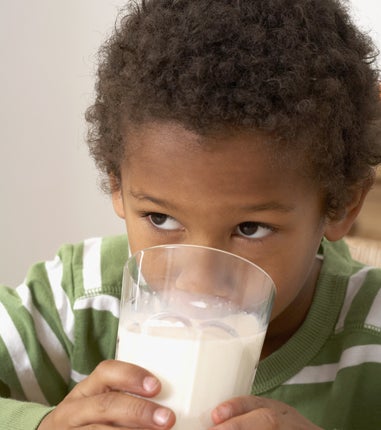Milk was the elixir of life for pre-war Britons
Study shows milk protected against heart attacks and strokes

"Drinka pinta milka day", one of the most popular advertising slogans of the 1950s, has turned out to be the secret of long life.
A 65-year study of children born in the 1930s has found those who drank more milk and consumed other dairy products had a lower death rate than those who drank less.
Calcium, which is present in milk and all dairy foods, was a key factor behind their better health. Calcium is essential for developing bones and there is also evidence that it reduces blood pressure in children, which may provide long-term protection against heart attacks and stroke.
Thickening of the arteries leading to heart disease begins in childhood and a high-fat diet is thought to accelerate the process. But although consumption in adulthood of whole milk, butter and cheese, which have high levels of saturated fat, is thought to contribute to heart disease, the long-term effects of consuming these foods in childhood has been unclear.
Researchers from the University of Bristol in the UK and the Queensland Institute of Medical Research in Australia followed up a study originally done between 1937 and 1939 in pre-war Britain, when 1,343 families from England and Scotland kept detailed food diaries for seven days.
More than six decades later, the researchers successfully traced 4,374 of the children involved in the original study and found out what had happened to them between 1948 and 2005.
They found a third of them had died, including 378 deaths from heart disease and 121 deaths from stroke. Those with the highest dairy intake averaging 471 grams a day, over 90 per cent of it as milk, had a 23 per cent lower risk of dying compared with those with the lowest intake of 89 grams a day. The study was funded by the World Cancer Research Fund.
Richard Martin, from the University of Bristol, senior British author of the study, published in the journal Heart, said: "The more milk and calcium the children consumed the lower their mortality. It is possible that there is an influence of milk drinking on hormonal or growth factors that set you up to be better off in the long term. Calcium is also important – it is involved in cell signalling and helps maintain the normal physiology of the blood vessels."
The break-time bottle of milk has been a feature of primary school playgrounds since the 1950s, introduced to boost the nutrition of a post-war generation. In the 1970s, school milk fell victim to cuts imposed by the then Tory education secretary, Margaret Thatcher – dubbed "Milk Snatcher" – before she became prime minister. But Dr Martin cautioned against applying the findings to present day children raised on different – and richer – diets.
"We certainly haven't seen any adverse effect of milk on children, as some people had thought. We should be a little cautious about saying it has a protective effect. There could be other factors at work – extra milk drinking could be associated with greater affluence though we tried to control for that – and other studies need to be conducted to confirm the findings," he said.
*Strenuous exercise such as jogging, carried out on a regular basis, cuts the risk of cancer more effectively than milder forms of exercise such as walking, according to a study in the British Journal of Sports Medicine.
Researchers from Finland who studied 2,500 middle-aged men over a year say that physical activity which involves a higher consumption of oxygen reduces illness and the risk of dying from cancer. Measurement of the amount of oxygen consumed in a range of activities showed that men who exercised to a moderate or high intensity level for at least 30 minutes a day were half as likely to get cancer as those who did not.
Subscribe to Independent Premium to bookmark this article
Want to bookmark your favourite articles and stories to read or reference later? Start your Independent Premium subscription today.

Join our commenting forum
Join thought-provoking conversations, follow other Independent readers and see their replies